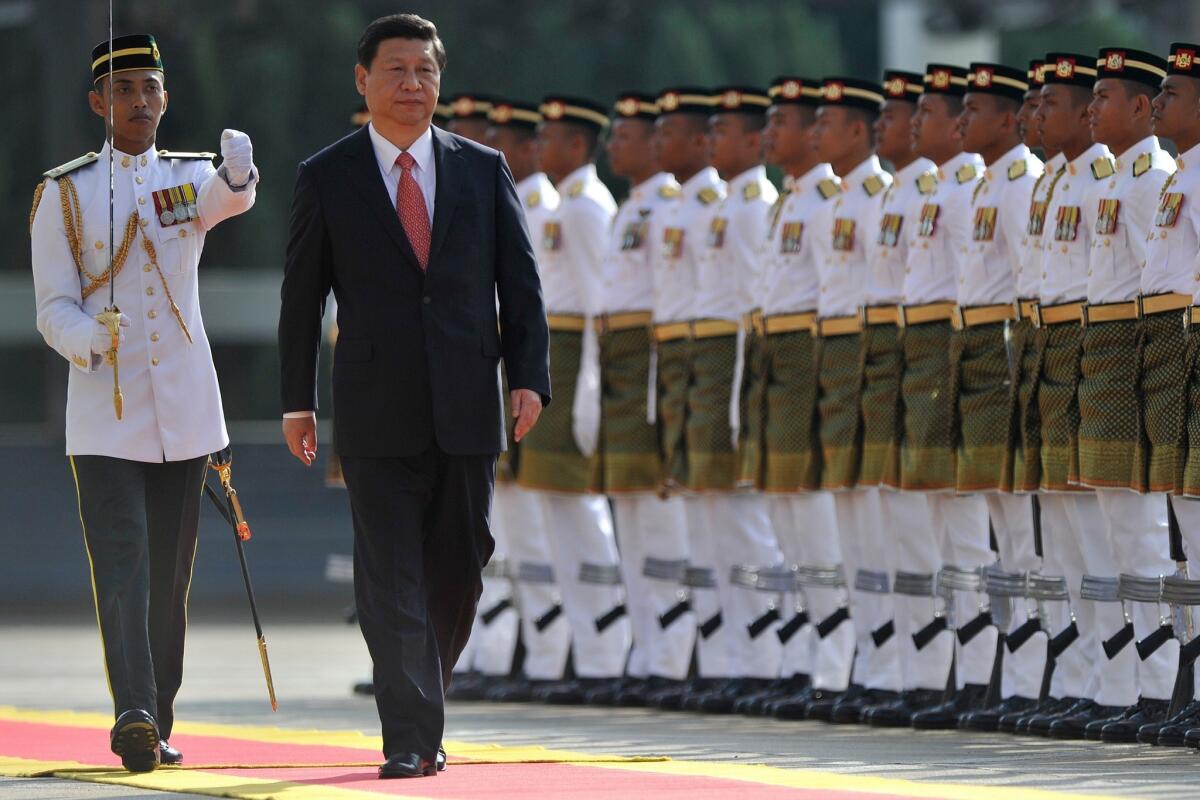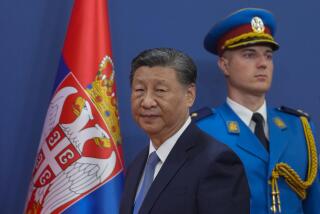Cancellation of Obama’s Southeast Asia trip a boost for China’s Xi

BEIJING -- Splashed across the front pages, there is China’s president, Xi Jinping, resplendent as he strolls with his photogenic first lady down the red carpet welcoming him in Malaysia.
There Xi is again in Jakarta — the first foreign leader to address Indonesia’s parliament, calling for a “maritime silk road” to bring share China’s prosperity with Southeast Asia.
All the while President Obama — wings clipped by the impasse with Congress – finds himself grounded in Washington.
The optics couldn’t be worse. The cancellation of the president’s trip to Southeast Asia comes at a triumphant moment for China’s president, who is basking in the attention that might otherwise be diverted to Obama.
The White House announced Thursday that Obama would cancel a trip to the Indonesian island of Bali for the Asia-Pacific Economic Cooperation summit, as well as a subsequent stop in Brunei. Earlier in the week, the administration said that two later stops in the Philippines and Malaysia had been cut because of staffing problems due to the government shutdown.
“It shows the decline of the United States,’’ said Shen Dingli, a professor of American studies at Shanghai’s Fudan University.
The cancellation of the trip belies earlier U.S. claims of making a “pivot” toward Asia in foreign policy.
“That’s a joke,” said Shen. “If they can’t pass a budget at home, how can they lead Asia and the world?”
Secretary of State John F. Kerry will represent the United States at the summit in Bali, but he lacks Obama’s celebrity power, especially in Indonesia, where the president lived as a child.
That leaves Xi as the unchallenged star attraction at a forum where the United States and China have a pressing rivalry. Many Southeast Asian countries, particularly Vietnam and the Philippines, are looking to the United States as a counterweight to China’s territorial ambitions in the South China Sea.
“From a symbolic standpoint at least, the cancellation of the trip is very damaging to American diplomacy,” said Shi Yinhong of Beijing’s Renmin University. “Until now, the U.S. has been very successful diplomatically in Southeast Asia, while China has been strong only economically and financially.”
Not adverse to flashing its money around, China used the trip to Indonesia this week to announce a slew of new deals.
Xi proposed setting up an Asian investment bank to support “connectivity” among Asian countries. He and Indonesian President Susilo Bambang Yudhoyono also announced $32.8 billion worth of investment deals in transportation, real estate, mining, paper and lumber products.
In Kuala Lumpur on Friday, Xi and Malaysian Prime Minister Najib Razak promised to boost economic and military ties and to triple bilateral trade to $160 billion by 2017.
“China’s dream and Asia’s promise can be fulfilled together in an age marked by prosperity and stability in equal measure,” Najib was quoted as saying by the Chinese state news agency.
Xi is now heading to Bali for the start of the regional summit. This is Xi’s first visit to the region as China’s leader. He took over as president in March, after stepping up as general secretary of the Chinese Communist Party last year.
The Chinese state press has been curiously silent on the subject of the U.S. government shutdown, running straightforward wire stories and restraining itself from triumphalist commentary. One reason is that China has been virtually shut down for a weeklong national holiday.
Tuesday marked the anniversary of the 1949 founding of the People’s Republic of China. A popular joke making the rounds in Beijing this week notes that it was the same date that the U.S. government shut down.
“President Obama sent a congratulatory telegram to President Xi: To celebrate the Chinese National Day, the U.S. government decided to shut down from this morning,’’ wrote one microblog commentator on the popular Sina.com website.
ALSO:
Gunmen attack Egyptian troops; Morsi backers hold protests
No such thing as ‘Israeli nationhood,’ country’s Supreme Court says
War, poverty, repression: Why so many Africans risk their lives to migrate
More to Read
Sign up for Essential California
The most important California stories and recommendations in your inbox every morning.
You may occasionally receive promotional content from the Los Angeles Times.










